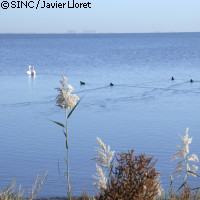Mar Menor lagoon feeling the heat
Environmentalists the world over are keen to preserve biodiversity but climate change is giving them a run for their money. One victim to such change is the Mar Menor (little sea) lagoon located on the Costa Calida coastline in Spain, say researchers from the University of Murcia. In their latest study, the researchers found that an up to 5°C rise in water temperatures by 2013 will not only influence the ecological status of many coastal lagoons, but will trigger processes of eutrophication as well. Their findings were recently published in the Estuarine Coastal and Shelf Science journal. Supported by the Euro-Mediterranean Institute of Water, the researchers created a key data-based assessment of how the lagoon's coastal ecosystem has been feeling the heat of late. The root of the problem is the changes impacting the environment and eutrophication, the process by which a body of water (e.g. a lake) that is rich in mineral and organic nutrients fuels the proliferation of marine wildlife, including jellyfish. Another concern is an increase in the regression of benthic (i.e. seabed) primary producers, the researchers said. The Scientific Information and News Service (SINC) quoted the researchers as saying that understanding the interaction between the processes for establishing effective coastal planning and management measures, and identifying future impacts, is important. 'If climate change predictions come true, the current state of the Mar Menor lagoon could collapse due to proliferations of phytoplankton and floating macroalgae,' Dr Javier Lloret was quoted as saying. A member of the research team, Dr Lloret commented how 'eutrophication processes with high concentrations of nutrients' are adversely affecting the entire ecosystem. A drop in benthic macrophytes and the emergence of eutrophication processes may well trigger a 'substantial decrease in the quality of the lagoon's habitat with unforeseen consequences for the biological diversity of its communities', the researcher added. Another potential headache is that the proliferation of phytoplankton cuts the amount of light reaching the beds of Mar Menor. 'This reduction is the result of the combined effect of the rise in sea level and decrease in the transparency of the water column caused by an increase in the entry of nutrients and dissolved solids,' Dr Lloret said. This ground-breaking research does not target the Mar Menor solely; it can be applied to lagoons worldwide. There are many key elements that wreak havoc on lagoons including water temperature hikes, variances in water mass hydrodynamism and increased dissolved carbon dioxide, the research showed. The research predicts that the global climate 'will have a high effect' on coastal lagoons, said Dr Lloret, adding that the lagoons are believed to be 'one of the most fragile marine environments to these changes'.
Countries
Spain

